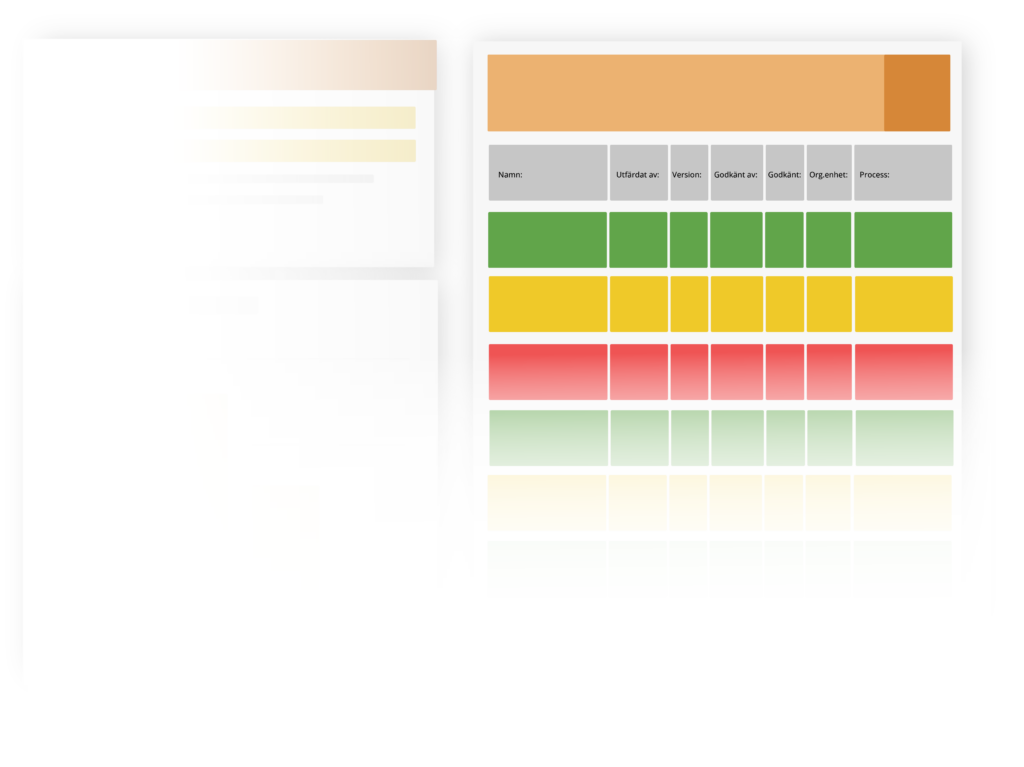Add 8D Reporting
Anticipate and prevent
issues with 8D Reporting
Add 8D reporting provides a comprehensive solution for managing and solving
problems based on the 8-step method.
Add 8D Reporting an efficient problem-solving method
The 8D problem-solving method, also known as Eight Disciplines, is one of the most effective problem-solving methods for identifying, analyzing, and resolving issues within organizations. The method is commonly applied in quality improvement and is used to identify the root cause of a problem, design a short-term action, and implement a long-term solution to prevent the problem from recurring.

How the 8D method works
Below is a description of the eight steps in the 8D method and thus of the case steps in our solution:
D1: Create a team
Form a team The first step involves forming a team that will solve the problem. It is important for the team to have diverse experiences and knowledge to ensure a comprehensive and versatile perspective.
D2: Describe the problem
Describe the problem In step 2, it is about clearly describing the problem. This can be done by answering the questions: what, where, who, how, when, and why.
D3: Develop a temporary solution
Develop a temporary solution After identifying the problem, the next step is to quickly implement temporary solutions that prevent the customer from being affected by the problem. This may involve temporary fixes or control measures to prevent further damage or incidents. Typically, this solution is later removed in the process when a long-term and permanent solution is found.
D4: Identify and verify root causes of the problem
Identify and verify root causes Now it’s time to analyze and identify the root cause of the problem. This is done by applying various tools and methods such as the 5 Whys analysis, fishbone diagram (Ishikawa diagram), or other appropriate techniques.
D5: Take permanent action
Implement permanent corrective actions Once the root cause has been determined, it’s time to develop and implement permanent corrective actions. This may involve redesigning processes, improving standards, training staff, or implementing new systems or controls.
D6: Validate actions
Validate actions This step is about evaluating and validating the effectiveness of the implemented actions. It may involve collecting data, conducting tests, and analyzing results to ensure that the permanent corrective actions adequately address the problem.
D7: Prevent the problem from occurring again
Prevent recurrence To prevent the same problem from recurring, it is important to implement preventive measures. This may involve improving procedures, monitoring processes, providing training, or implementing preventive maintenance measures.
D8: Congratulate the team and celebrate!
Congratulate the team and celebrate! Finally, it is important to acknowledge and reward the team’s efforts and achievements. This may include sharing success stories, spreading knowledge and experiences to other parts of the organization. In Add, this is the final step after which a case is considered completed and leaves the case flow, being stored in a separate list of completed cases.
Advantages of Add 8D Reporting

Effective problem solving
Add 8D reporting is based on the structured and proven 8D problem-solving method, which enables efficient and systematic management of problems and deviations within the organization.

Overview and traceability
The tool provides users with a clear overview of cases and their status. It enables traceability, making it easier to follow the development of problems and issues over time.

Collaboration in
cross-functional teams
Add 8D reporting enables collaboration among members from different departments or functions, leading to a broader knowledge base and diverse perspectives in problem-solving.

Structured Process
The method follows the structured 8D process, ensuring that no crucial steps are overlooked. This contributes to effective and reliable problem-solving.

Time and cost savings
The ability to authorize access and use of Add 8D reporting saves time and resources by allowing the right people to focus on the right tasks in the problem-solving process.

Prevention
By implementing and following up on long-term solutions, Add 8D reporting helps prevent recurring problems and improve quality and efficiency within the organization.
Customer recommendations
We have previously used Excel for Complaints/Deviation/Complaints management. By “automating” the process, the handling becomes more efficient. Key aspects when choosing Add were the system’s flexibility and Addsystems’ willingness and ability to provide support.
Nevena Ratkov, Bring Cargo
Add helps us quickly disseminate news within the organization and simplifies our work with internal information, leave management, and registering deviations.
Robert Hill, Doktorama
The best thing about Add is that it is very user-friendly and easy to use. Everyone can easily find the desired information, which helps the business in terms of time savings, efficiency, and doing things correctly. We can also easily see if the information is being communicated effectively.
Freddy Jensen, Euromaster
The best thing about Add is that we have all complaints in one place, with a clear record of when they were submitted and the workflow the case has gone through. Nothing is forgotten. It is intuitive, so everyone understands it without needing a “course” on how it works.
Tina Flodins, GBJ Bygg
Add provides the user with a seamless and comprehensive overview of the company. It is easy for administrators to share information in a structured manner. It keeps the organization updated and informed.
Björn Källström, Orrefors
The best thing about Add is the overall efficiency, a high degree of operational value combined with relatively low administrative efforts. It is a good and easily accessible system support for our business systems, deviation management, and general information dissemination to the staff.
Mikael Jonsson, Gunnebo Fastening
Good response to activities that need to be resolved. We have gained better control over our task management.
Ingela Johansson, Nexans
It is possible to provide feedback and information quickly and easily to all employees within the organization simultaneously. Being able to have accessible management when employees are in the field and to gather materials and share knowledge in a common platform.
Elaine Snahr Bryntesson, Olivia hemtjänst
As we are spread across Sweden, Add becomes a common platform. Add solves our problems by having everything in one place, especially for saving and archiving.
Jessica Andersson, Rekal
Add is a simple and user-friendly tool for document management, meeting management, process and case management, and more, making it easy to establish and maintain even complex integrated management systems. With the help of Add, we have achieved good order and increased efficiency in our operations.

